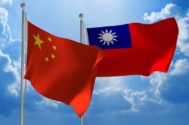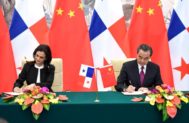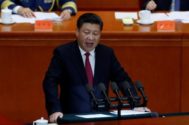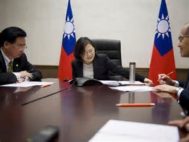Authors
Kevin Scott

Kevin C. Scott is an independent researcher. His substantive interests include the history of US relations with Taiwan and Asia, and he has written previously on political relations between China and the Vatican. He holds a B.A. in government from the University of Notre Dame and an M.A. in Asian studies from the University of Pittsburgh.
Articles by Kevin Scott

China - Taiwan
January — April 2018Taiwan Caught Between US and China
General Secretary Xi Jinping maneuvered the Chinese Communist Party (CCP) into removing term limits so that he can lead China indefinitely. Beijing has increased pressure on Taiwan, but also rolled out new measures aimed at increasing Taiwan’s economic and social integration with the mainland. On Taiwan, pro-independence elements continue pressing President Tsai Ing-wen. The passage of the Taiwan Travel Act (TTA), which was generally welcomed in Taipei, created a new US-China controversy. The appointment of John Bolton as national security advisor and the Trump administration’s tariff and technology actions against China have renewed fears in Taipei that Taiwan will become a bargaining chip or suffer collateral damage in a US-China confrontation.

China - Taiwan
September — December 2017Continuity After 19th Party Congress
Defying some predictions, the outcome of the 19th National Congress of the Chinese Communist Party indicates there will be no significant change in Beijing’s policy toward Taiwan. Beijing will continue to demand that President Tsai Ing-wen accept the 1992 consensus and pressure on her administration will be sustained. In Taiwan, Tsai has supported domestic actions that Beijing fears are weakening cross-strait ties and her pro-independence supporters continue to press for steps that risk increasing tensions. Tsai has also urged Beijing to join in finding a new model for their relations. Beijing’s pressure on Taiwan is stimulating calls in Washington for policies that are more supportive of Taiwan. These developments in Taiwan and Washington have in turn triggered warnings from Beijing.

China - Taiwan
May — August 2017China Increases Pressure, Tsai Holds the Line
In the run-up to the 19th Party Congress, Beijing has pursued an inflexible policy toward Taiwan, consistently blocking its international participation, establishing diplomatic relations with Panama, and conducting military exercises around Taiwan. Despite such pressures, President Tsai, whose priorities are domestic economic and social reform, has not changed her policy that neither accepts nor explicitly challenges Beijing’s one-China principle, and she has urged Beijing to join in seeking a new formula. With the US Congress expressing increased support for Taiwan, the Trump administration approved a new arms sales package and took other steps to improve ties with Taiwan. Beijing has warned Washington about closer ties with Taipei, raising the prospect that Taiwan will again become a divisive issue in US-China relations. In the absence of dialogue, unstable and risky cross-strait relations will continue in the months ahead.

China - Taiwan
January — April 2017Adrift Without Dialogue
In February, President Trump told President Xi Jinping that the US would honor its one-China policy. This eased concern that the new administration would radically change US policy toward Taiwan, but it remains unclear how the Trump administration will deal with specific Taiwan issues. Relations between Beijing and Taipei have continued to be in an unstable but calm state in the early months of 2017. The formal channels of dialogue remain closed and no significant effort has been made to reopen them. In the meantime, practical issues have been dealt with, sometimes constructively but often in ways that exacerbate the lack of trust. This unstable and risky situation will likely continue in the months ahead.

China - Taiwan
September — December 2016Adjusting to New Realities
After President Tsai’s inauguration, Beijing continued to press her to accept the 1992 Consensus on one China. When China blocked ICAO from inviting Taipei in September, Tsai reacted sharply. In her “Double Ten” remarks, she reaffirmed her cross-strait policy and said she would neither give in to pressure nor return to past confrontational actions. In October, CCP General Secretary Xi Jinping made remarks implying Beijing’s understanding that Tsai would not endorse one China. The election of Donald Trump created in Taipei both hope of friendship from Republicans and concern Taipei could become a pawn in Trump’s bargaining with China. Trump’s tweets about his telephone conversation with Tsai and comments about one China and trade have sparked intense speculation and uncertainty about their implications for cross-strait and US relations with Taiwan and China.
China - Taiwan
May — August 2016Relations Better than Expected
Democratic Progressive Party (DPP) Chairperson Tsai Ing-wen was inaugurated as president on May 20. In her inaugural address, she did not accept “one China” but did reach out further toward Beijing. Beijing gave her address an “incomplete” grade and has continued to press her to accept the 1992 Consensus. Despite this fundamental divide and deep mutual mistrust, the two sides have been able to handle some issues in a pragmatic manner. Although the formal communications channels have been suspended by Beijing, contacts at other levels continue under the network of cross-strait agreements. Many issues will continue to complicate the management of relations. However, Tsai remains committed to maintaining stable relations and Xi Jinping, preoccupied with other challenges, prefers to avoid a confrontation with Taiwan.
China - Taiwan
January — April 2016Taiwan Sets a New Direction
Democratic Progressive Party (DPP) Chairperson Tsai Ing-wen was elected president on Jan. 16 by a decisive margin, and for the first time the DPP won a majority in the Legislative Yuan (LY) election. This outcome has set Taiwan on a new course. Since then, Tsai has adhered to her pledge to maintain the status quo and peace in the Taiwan Strait and has taken steps to continue reaching out to Beijing. Beijing reacted calmly to the election and has repeatedly said the election will not change the basic framework of its peaceful development policy toward Taiwan. However, Beijing is waging a focused campaign to press Tsai to accept the 1992 Consensus in her inaugural address on May 20. Even if she does not fully meet Beijing’s demands, as is expected, it will be in the interest of both sides to avoid confrontation after May 20 in what is likely to be a strained relationship.
China - Taiwan
September — December 2015A Meeting and a Campaign
General Secretary Xi Jinping and President Ma Ying-jeou held the historic first Cross-Strait Leaders Meeting in Singapore, capping seven years of collaborative work to build stable and constructive cross-strait relations. On Taiwan, the Democratic Progressive Party (DPP) has conducted a well-run campaign, likely leading on Jan. 16 to Tsai Ing-wen winning a strong majority mandate in the presidential election and the KMT and its allies losing control of the Legislative Yuan (LY) for the first time. After the election, Tsai and Xi will share responsibility for avoiding a confrontation that is in neither of their interests.
China - Taiwan
May — August 2015KMT Disarray Shapes Campaign
The Kuomintang (KMT) Party’s mismanagement of the selection of its presidential candidate has left the party in disarray and increased the prospect that Democratic Progressive Party (DPP) candidate Tsai Ing-wen will win the presidency along with a majority in the Legislative Yuan (LY) elections. Faced with the prospect of DPP victories, Beijing has sent mixed messages to Taiwan, while voicing its confidence in preserving the accomplishments of the peaceful development policy for the long-term. Against this background, the Ma administration and Beijing have struggled to keep cross-strait relations moving forward.
China - Taiwan
January — April 2015Looking to a Different Future
Taipei’s relations with Beijing have been adrift with the Ma administration in a reactive mode. The main interactions have been on unexpected issues – China’s M503 air route and Taiwan’s effort to join the Asian Infrastructure Investment Bank (AIIB) – and results were mixed. Meanwhile all players are preparing for a different future. The KMT is trying to reform itself; new chairman Eric Chu Li-lun visited China and met General Secretary Xi Jinping in early May. Beijing is focused on working with the new KMT and on deterring the DPP from returning to office in 2016. The DPP and Chairperson Tsai Ing-wen have begun defining its policy toward Beijing before Tsai visits Washington in June.